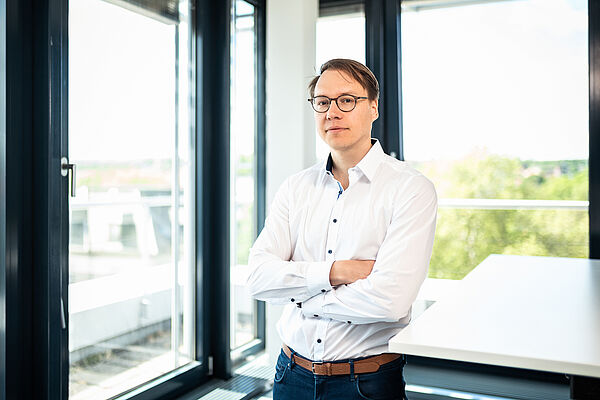Several new professors have joined the Faculty of Engineering at HTWK Leipzig since the beginning of the year. One of them is Marco Krondorf, Professor of Communications Engineering since 16 March
Who are you and where are you from?
I'm originally from Rosswein, a small town in central Saxony, and went to grammar school in Döbeln. After leaving school, I did a year of basic military service in Berlin and then studied information systems technology at the TU Dresden from 2000. After graduating, I completed a doctorate in mobile communications in Dresden and then founded the start-up INRADIOS together with a colleague in 2010. The focus of our company was and is the development of hardware and software for modern satellite communication. After the takeover of INRADIOS by Rohde & Schwarz in 2017, I was Head of Development at the Dresden site until the beginning of this year, where I also live with my family.
Where does your affinity for communications engineering come from?
Shortly after I finished school in 1999, the first mobile phones came onto the market. When I held one in my hand for the first time, I suddenly realised how little I understood about how modern technology works. I held this lifeless plastic box in my hands and it responded to my keystrokes in a meaningful way. I had no idea how it worked and, in a way, felt immature - my motivation to want to understand every bit of modern technology was my driving force from then on. In order not to be ostracised as a nerd, I volunteered for guard duty during my time in the German army so that I could study integral and differential calculus at night in peace and quiet.
What did you study?
I studied information systems engineering at the TU Dresden, an interdisciplinary degree programme in electrical engineering and computer science. This mixture was great, as the degree programme included a comprehensive mathematical education, but still gave me access to the latest methods, such as software technology. I had an important experience in the 6th semester. Until then, I hadn't had any major difficulties with the lecture content. Then I attended the subject 'Mobile Communication Systems' by Prof Gerhard Fettweis. The content of this lecture was so complex and multi-layered that I spent weeks studying the models for radio wave propagation, for example, and kept discovering new aspects. The difference to all the other lectures I had attended so far was that it was no longer enough to master the equations and memorise the relationships. Learning was suddenly no longer enough - I had to really understand it all. That makes a difference. From then on, I realised that I wanted to work in this field and attended all the relevant lectures with my future doctoral supervisor Gerhard Fettweis.
What do you teach at HTWK Leipzig?
I teach the modules Communications Engineering (4th semester), Communications Transmission Engineering (5th semester) and High Frequency Engineering (5th semester) in the Bachelor's programme. The compulsory elective module 5521 Communications Engineering in particular has not been taught for years. It can also be attended without having heard the Communications Engineering module beforehand. It mainly deals with the basics of digital signal transmission and explains, for example, how LTE and today's WLAN systems work.
In the Master's programme, I hold the Electronic Communications module with a focus on software-defined radio. In addition to communications engineering, I am now also gradually taking over the lectures on digital circuit technology from Prof Wolfgang Reinhold.
Unfortunately, due to the coronavirus crisis, I haven't been able to hold any lectures live in Leipzig yet, but I'm switching to the familiar online formats and holding all lectures live with screen sharing.
What are you currently researching?
I am currently working on testing and further developing the radio technology in the ICARUS project www.icarus.mpg.de . ICARUS is a global initiative, led by the Max Planck Institute of Animal Behaviour in Constance, to observe animals with the help of the International Space Station ISS. In the future, many interesting topics for Bachelor's and Master's theses will be developed within the framework of ICARUS.
What do you expect from students?
Above all, I expect a willingness to engage with the fundamentals of technology and to accept that in my lectures I always try to use mathematical methods to explain why things work. The willingness to see these explanations not just as peripheral information, but to work through them in detail as direct lecture content, is very important to me - even in subjects that often manage without many equations.
What are your next goals?
My next goal is to turn the old HF lab into a place where you can also hold lectures, seminars and practicals, so that experiments or demonstrations can be incorporated directly into the courses. My vision is for students to naturally talk about the HTWK ComLab as a cool place to learn, experiment, talk shop and exchange ideas.
